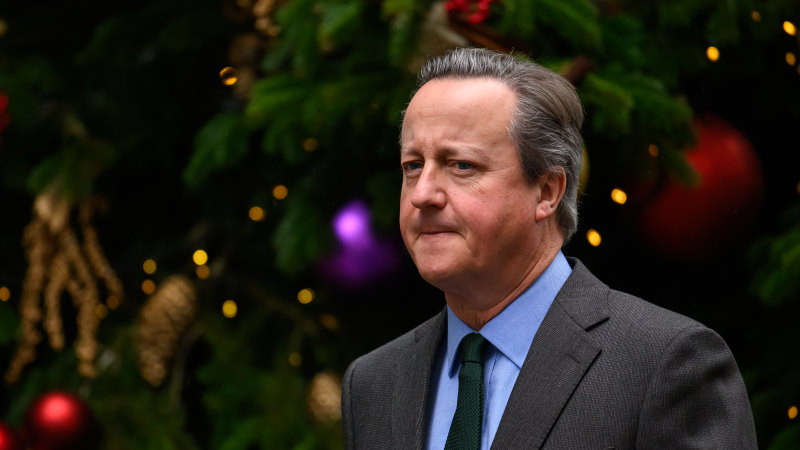Save articles for later
Add articles to your saved list and come back to them any time.
David Cameron, who oversaw the Golden Era of Sino-British relations, has told a US audience that China had changed since his time as prime minister and called on Congress to approve the AUKUS tech transfer laws to make the defence pact work.
Cameron was speaking at the Aspen Security Forum in Washington DC in his first appearance in the US since being made the UK’s foreign secretary last month.
Foreign Secretary David Cameron arrives in Downing Street ahead of the weekly cabinet meeting in London, England.Credit: Getty
Cameron has been widely panned for inviting Chinese investment in the UK’s critical infrastructure during his premiership and for the work he has done in barracking for Chinese interests since quitting after losing the Brexit referendum in 2016.
He said China had changed since his time in the top job and singled out Beijing’s economic coercion of Australia as an example of it being more hostile.
“Since I left office we’ve seen the treatment of the Uyghurs,” he said.
“We’ve seen the treatment of Hong Kong.
“We’ve seen the wolf warrior diplomacy.
“We’ve seen the kind of, you know, terrible situations that were created when Australia said something or Lithuania did something.
“It is a different China we’re dealing with and we need to harden our systems and be very clear-eyed as a result.”
But he defended his decision to invite more Chinese investment at the time he was PM, saying it had led to good economic outcomes for Britain.
Meanwhile, he told the American audience that staying the course in Ukraine mattered for China’s future actions, referencing the disastrous US withdrawal from Afghanistan, which many analysts believe contributed to Putin’s decision to invade Ukraine months later.
Under Cameron, Britain began training Ukrainian troops.
“China is watching what is happening in Europe … and we know from even quite recent history that if you pull back from one of these vitally important exercises in working together and showing resolve it resonates around the world.”
He said that withdrawing from the fight in Ukraine would be a Christmas gift for China’s President Xi Jinping and Putin.
US must make sure AUKUS works
Cameron also called on Congress to pass the International Traffic in Arms Regulations (ITAR) waivers that would enable the export of sensitive US defence weapons and technology.
An overdue vote is now expected before Christmas.
Separately, Congress needs to approve the sale of the three Virginia-class submarines that Australia is set to acquire to help deter the Chinese from taking control of the South China Sea.
He said Putin’s invasion had exposed the need for the West to build up its supply chains and weapons stocks properly.
As part of AUKUS, the three countries want to jointly produce new weapons and defence capabilities including hypersonic missiles.
“AUKUS, which is a great development, … won’t work as well if we, the Brits or the Australians, can’t sell weapons systems to other allies that need to defend themselves because of the restrictions from ITAR,” he said.
“We’ve got to find ways, as friends and allies and partners, to make sure we can help fellow democracies to defend themselves.”
James Rogers from the Westminster-based think tank Council for Geostrategy said the former prime minister had read the room.
“David Cameron appears to have acknowledged that China has moved on from the days when he was sharing pints with Xi Jinping,” he said.
“After all, Rishi Sunak said last year that the ‘golden era’ was over.
“AUKUS is the name of the game now: stopping the People’s Liberation Army Navy from seeking dominance in the Indo-Pacific.
Rogers said Congress needed to implement the legislation to make AUKUS occur.
“On this issue, Mr Cameron is right to press the US to reform, as without greater technological and defence industrial co-operation between the three, AUKUS will not reach its full potential.”
Get a note directly from our foreign correspondents on what’s making headlines around the world. Sign up for the weekly What in the World newsletter here.
Most Viewed in World
From our partners
Source: Read Full Article



